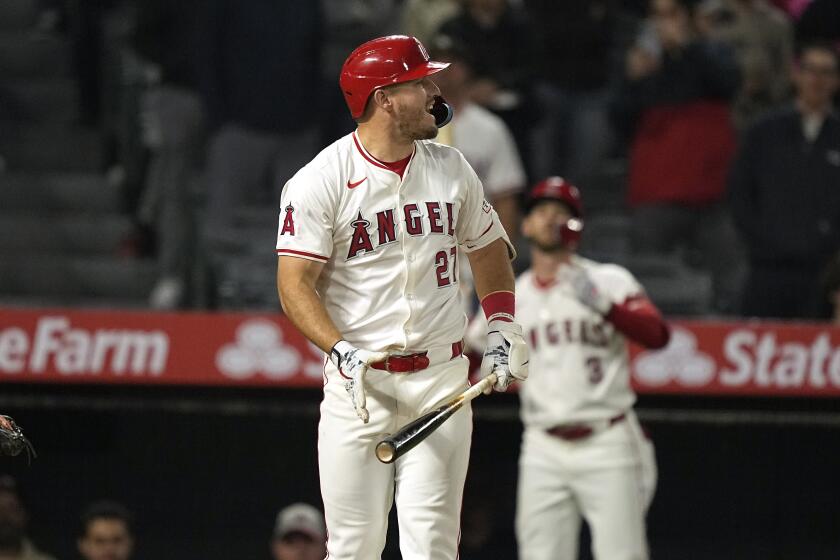Baseball to Toughen Up on Steroids
Baseball has hardened its policy against steroids and other performance-enhancing drugs in an agreement reached between the players’ union and owners that will be announced today, sources familiar with the negotiations said Wednesday.
The amendment to the Collective Bargaining Agreement will mandate more frequent testing, random off-season testing and suspensions for first-time offenders, baseball sources said.
Players’ Association chief Don Fehr notified the union’s executive board members of the policy changes during a conference call Wednesday. Owners were briefed during their annual meetings in Scottsdale, Ariz., attended by Commissioner Bud Selig.
In light of growing concerns about steroids because of the Bay Area Laboratory Co-Operative scandal, and fearing an erosion of the public’s trust in the game, Selig had requested a program more closely resembling that held in the minor leagues, which are not protected by the CBA.
The new policy mirrors the minor league principles “in a lot of ways,” a source said, particularly in regard to disciplinary measures and monitoring.
“Everybody believed that the program we had in place was having an effect and definitely it was doing what it was designed to do,” New York Met pitcher Tom Glavine told Associated Press, “but having said that, with the stuff that was going on and whatnot, it forced us to take a look at revising it or making it a little tougher. It was not a question anymore if that agreement was going to be enough. It was a question to address some of the new issues that came to light and get our fans to believe we were doing everything we could to make the problem go away 100%.”
Neither Fehr nor baseball negotiator Rob Manfred could be reached for comment. Dodger player representative David Ross declined to comment until after today’s announcement.
About the time members of Congress joined Selig in his forceful anti-steroid statements, and shortly after leaked federal grand jury testimony linked Barry Bonds, Jason Giambi and Gary Sheffield to BALCO products, union members authorized Fehr to negotiate an amendment to the 2002 basic agreement.
Giambi reportedly told the grand jury he used steroids for about three years and that they had been provided by Bonds’ personal trainer, Greg Anderson, who has been indicted in the BALCO case. Bonds testified he used BALCO-supplied substances he believed to be flaxseed oil and arthritic balm but which prosecutors believed were steroids, the San Francisco Chronicle reported. In October, Sheffield told Sports Illustrated he had used a topical cream provided by Anderson and BALCO that he later learned was a steroid.
None has been disciplined by baseball, and Yankee General Manager Brian Cashman said this week he expected Giambi to report for spring training.
BALCO founder Victor Conte told ABC in December he believed that half of major-league players were taking steroids.
Baseball and the union instituted survey testing for steroids in 2002. Last season, players were tested with the threat of disciplinary action, though they could not be suspended until a second positive test.
The minor-league program calls for up to four unannounced tests annually, including the off-season. A first offense draws a 15-game suspension without pay; a fourth suspension means a one-year ban, a fifth strike permanent suspension.
The minor-league rules do not provide for testing for human growth hormone or EPO, a blood-boosting agent, both part of Olympic testing. The Olympics have year-round no-notice testing for steroids and a wide range of other substances, and the rules provide for a two-year ban for even a first offense.
It is believed suspensions for major leaguers would be shorter than for minor leaguers, and that they would be without pay. Some of the players randomly tested, according to sources, would be chosen by a lottery-type system.
*
Times staff writer Alan Abrahamson contributed to this report.
More to Read
Go beyond the scoreboard
Get the latest on L.A.'s teams in the daily Sports Report newsletter.
You may occasionally receive promotional content from the Los Angeles Times.




